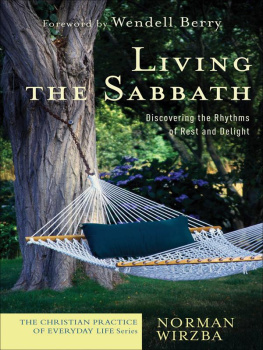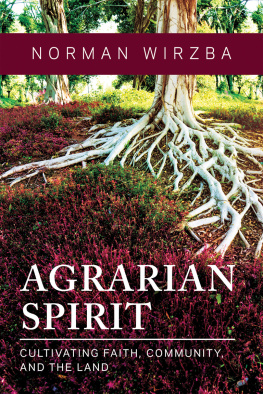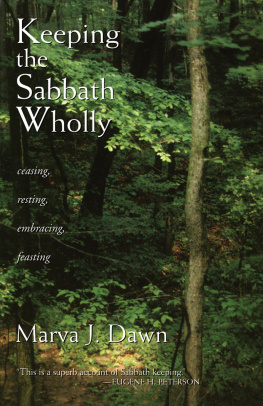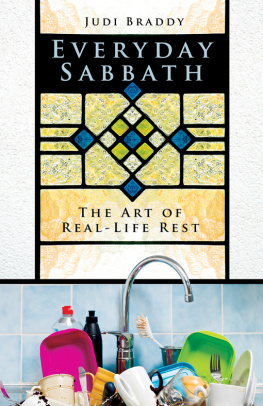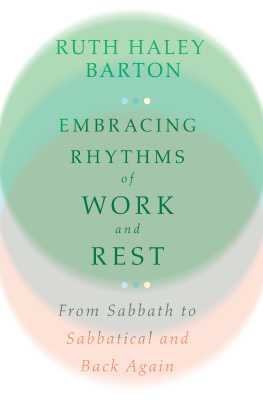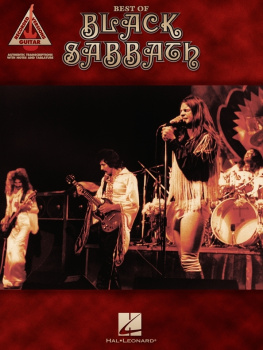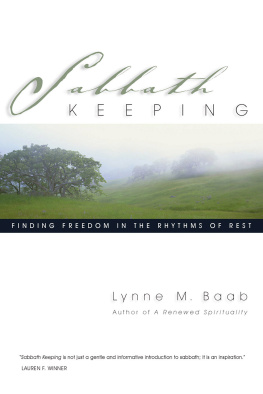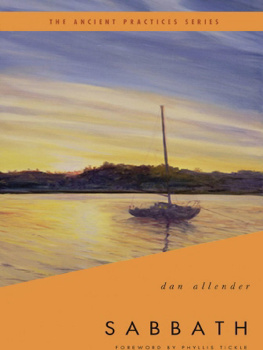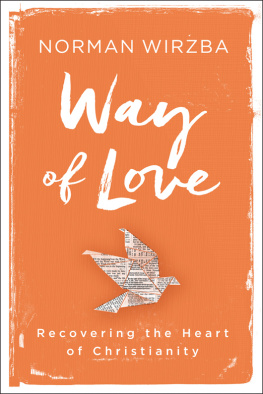Norman Wirzba - Living the Sabbath: Discovering the Rhythms of Rest and Delight
Here you can read online Norman Wirzba - Living the Sabbath: Discovering the Rhythms of Rest and Delight full text of the book (entire story) in english for free. Download pdf and epub, get meaning, cover and reviews about this ebook. year: 2006, publisher: Baker Publishing Group, genre: Religion. Description of the work, (preface) as well as reviews are available. Best literature library LitArk.com created for fans of good reading and offers a wide selection of genres:
Romance novel
Science fiction
Adventure
Detective
Science
History
Home and family
Prose
Art
Politics
Computer
Non-fiction
Religion
Business
Children
Humor
Choose a favorite category and find really read worthwhile books. Enjoy immersion in the world of imagination, feel the emotions of the characters or learn something new for yourself, make an fascinating discovery.
- Book:Living the Sabbath: Discovering the Rhythms of Rest and Delight
- Author:
- Publisher:Baker Publishing Group
- Genre:
- Year:2006
- Rating:5 / 5
- Favourites:Add to favourites
- Your mark:
- 100
- 1
- 2
- 3
- 4
- 5
Living the Sabbath: Discovering the Rhythms of Rest and Delight: summary, description and annotation
We offer to read an annotation, description, summary or preface (depends on what the author of the book "Living the Sabbath: Discovering the Rhythms of Rest and Delight" wrote himself). If you haven't found the necessary information about the book — write in the comments, we will try to find it.
Norman Wirzba: author's other books
Who wrote Living the Sabbath: Discovering the Rhythms of Rest and Delight? Find out the surname, the name of the author of the book and a list of all author's works by series.
Living the Sabbath: Discovering the Rhythms of Rest and Delight — read online for free the complete book (whole text) full work
Below is the text of the book, divided by pages. System saving the place of the last page read, allows you to conveniently read the book "Living the Sabbath: Discovering the Rhythms of Rest and Delight" online for free, without having to search again every time where you left off. Put a bookmark, and you can go to the page where you finished reading at any time.
Font size:
Interval:
Bookmark:
Praise for Living the Sabbath
In our hot-and-now commodity culture, in which even religion is often seen as just another thing to be consumed, Living the Sabbath is a clarion call to retrieve the wisdom of the biblical understanding of Sabbath. Clearly and engagingly written, free of scholarly clutter, and brim full of much practical insight on how to live with joy and delight, Norman Wirzbas book is a welcome and timely addition to the Christian Practice of Everyday Life series. This book deserves a wide readership.
Steven Bouma-Prediger, Hope College
Norman Wirzbas Living the Sabbath takes us beyond the usual depictions of Sabbath as individual retreat into the practices of Sabbath that engage the fullness of our lives. He explores what it means to live out of a sense of Sabbath in family and community relationships, work and social commitments, and in the theological expressions of delight in the goodness of God. Here is a text for living simply and in the continuing transformation of our lives by Gods grace.
Malcolm Lyle Warford, Lexington Theological Seminary
This book reads so well that youre tempted to speed through it. But dont. Enjoy it with a glass of iced tea; sit in your rocking chair on the porch and savor it, read slowly, let it sink in. Turn off the television, stay away from the mall, have a conversation with your neighbors, eat homegrown tomatoes. Practice it while you read it. Learn to do Sabbath. Take delight.
Kyle Childress, pastor of Austin Heights Baptist Church, Nacogdoches, Texas
Living
the Sabbath
The Christian Practice of Everyday Life
David S. Cunningham and William T. Cavanaugh, series editors
This series seeks to present specifically Christian perspectives on some of the most prevalent contemporary practices of everyday life. It is intended for a broad audienceincluding clergy, interested laypeople, and students. The books in this series are motivated by the conviction that, in the contemporary context, Christians must actively demonstrate that their allegiance to the God of Jesus Christ always takes priority over secular structures that compete for our loyaltyincluding the state, the market, race, class, gender, and other functional idolatries. The books in this series will examine these competing allegiances as they play themselves out in particular day-to-day practices, and will provide concrete descriptions of how the Christian faith might play a more formative role in our everyday lives.
The Christian Practice of Everyday Life series is an initiative of The Ekklesia Project, an ecumenical gathering of pastors, theologians, and lay leaders committed to helping the church recall its status as the distinctive, real-world community dedicated to the priorities and practices of Jesus Christ and to the inbreaking Kingdom of God. (For more information on The Ekklesia Project, see .)
Living
the Sabbath
Discovering the Rhythms
of Rest and Delight
THE CHRISTIAN PRACTICE OF EVERYDAY LIFE Series
Norman Wirzba

2006 by Norman Wirzba
Published by Brazos Press
a division of Baker Publishing Group
P.O. Box 6287, Grand Rapids, MI 49516-6287
www.brazospress.com
Printed in the United States of America
All rights reserved. No part of this publication may be reproduced, stored in a retrieval system, or transmitted in any form or by any meansfor example, electronic, photocopy, recordingwithout the prior written permission of the publisher. The only exception is brief quotations in printed reviews.
Library of Congress Cataloging-in-Publication Data
Wirzba, Norman.
Living the Sabbath : discovering the rhythms of rest and delight / Norman Wirzba.
p. cm. (The Christian practice of everyday life)
Includes bibliographical references.
ISBN 10: 1-58743-165-3 (pbk.)
ISBN 978-1-58743-165-4 (pbk.)
1. RestReligious aspectsChristianity. 2. Sabbath. I. Title. II. Series.
BV4597.55.W57 2006
263'.1dc22 2006010011
Scripture is taken from the New Revised Standard Version of the Bible, copyright 1989, Division of Christian Education of the National Council of the Churches of Christ in the United States of America. Used by permission. All rights reserved.
For Gretchen
Unto my Mind again repair:
Which makes my Life a Circle of Delights...
Contents
by Wendell Berry
 We are living at the climax of industrialism. The cheap fossil fuels, on which our world has grown dependent, are now becoming expensive in money and in lives. The industrial era at climax, in the panic of long-anticipated decline, has imposed on us all its ideals of ceaseless pandemonium. The industrial economy, by definition, must never rest. Rest would deprive us of light, heat, food, water, and everything else we need or think we need. The economic impulse of industrial life (to stretch a term) is limitless. Whatever we have, in whatever quantity, is not enough. There is no such thing as enough. Our bellies and our wallets must become oceanic, and still they will not be full. Six workdays in a week are not enough. We need a seventh. We need an eighth. In the industrial world, at climax, one family cannot or will not support itself by one job. We need a job for the day and one for the night. Thank God for the moon! We cannot stop to eat. Thank God for cars! We dine as we drive over another paved farm. Everybody is weary, and there is no rest.
We are living at the climax of industrialism. The cheap fossil fuels, on which our world has grown dependent, are now becoming expensive in money and in lives. The industrial era at climax, in the panic of long-anticipated decline, has imposed on us all its ideals of ceaseless pandemonium. The industrial economy, by definition, must never rest. Rest would deprive us of light, heat, food, water, and everything else we need or think we need. The economic impulse of industrial life (to stretch a term) is limitless. Whatever we have, in whatever quantity, is not enough. There is no such thing as enough. Our bellies and our wallets must become oceanic, and still they will not be full. Six workdays in a week are not enough. We need a seventh. We need an eighth. In the industrial world, at climax, one family cannot or will not support itself by one job. We need a job for the day and one for the night. Thank God for the moon! We cannot stop to eat. Thank God for cars! We dine as we drive over another paved farm. Everybody is weary, and there is no rest.
To rest, we are persuaded, we must get away. But getting away involves us in the haste, speed, and noise, the auxiliary pandemonium, of escape. There is, by the prevailing definition, escape, but there is no escape from escape. Or there is none unless we adopt the paradoxical and radical expedient of just stopping.
Just stopping is the opportune subject of this book. The thought of just stopping is not new and it is not simple. In biblical tradition, it is one of the oldest thoughts. Humans, one must suppose, thought of stopping soon after they had thought of whatever first made them tired. But biblical tradition elevates just stopping above physiology necessity, makes it a requirement, makes it an observance of the greatest dignity and mystery, and assigns it a day. The day is named Sabbath. On that day people are to come to rest, just stop, and not merely because they are tired; they are to do so in commemoration of the seventh day, the day on which, after the six days of creation, God rested.
He was not able to rest until the seventh day because the creation was not completed until the end of the sixth day. The world, once it was made, was not complete in the sense that it was done or finished. It was complete because it was whole. Its maker had so filled it with living creatures so invested with his spirit and breath that it could keep on working, it could live on its own, while he rested. It was an active and ongoing wholeness. It was a wholeness that could adapt and change; it could evolve, as you may say if you wish. That too.
And so the humans who remember the Sabbath day do so not only to rest, but also to honor the rest of the seventh day, which perfected the work of the six days. This rest is made possible by the capability of the creation, once made whole, to continue indefinitely on the basis of its originating principles and its culminating goodness. The creation is a living work in which every creature must participate, by its own nature and by the nature of the world. We humans, by our particular nature, must participate for better or worse, and this is our choice to make. Will we choose to participate by working in accordance with the worlds originating principles, in recognition of its inherent goodness and its makers approval of it, in gratitude for our membership in it, or will we participate by destroying it in accordance with our always tottering, never resting self-justifications and selfish desires?
Next pageFont size:
Interval:
Bookmark:
Similar books «Living the Sabbath: Discovering the Rhythms of Rest and Delight»
Look at similar books to Living the Sabbath: Discovering the Rhythms of Rest and Delight. We have selected literature similar in name and meaning in the hope of providing readers with more options to find new, interesting, not yet read works.
Discussion, reviews of the book Living the Sabbath: Discovering the Rhythms of Rest and Delight and just readers' own opinions. Leave your comments, write what you think about the work, its meaning or the main characters. Specify what exactly you liked and what you didn't like, and why you think so.

